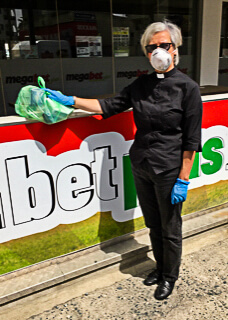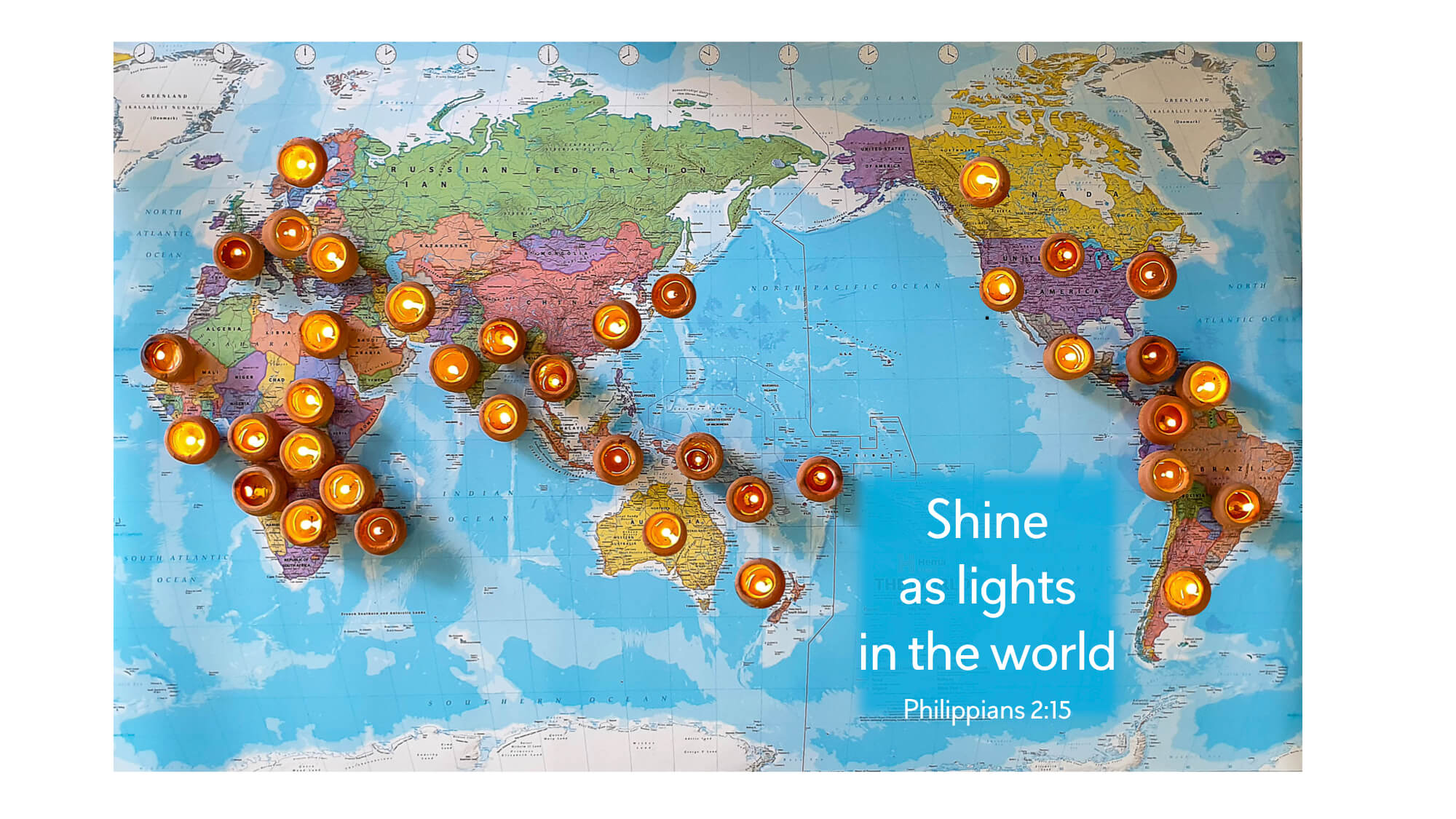Since February 2020, the Anglican Alliance has been convening regional and global consultations with participants from across the Communion to share learning about their experiences of COVID-19 and how the churches are responding. Although it is a time of great uncertainty and anxiety, it is also a time of deepening connections as people pray together and are inspired and encouraged by one another. Moreover, while church leaders are working hard to adapt their institutions and common worship life to the constraints of COVID-19 control measures, churches are also responding with remarkable energy and compassion to the most vulnerable – the homeless, the poorest, migrants and refugees and others – responding to human need in loving service.
With examples offered from around the Communion, these calls provide a significant platform for identifying key learning on what issues are emerging during this pandemic and how churches can be most effective in responding. This learning on church responses, along with information and guidelines about COVID-19, are compiled in the Anglican Alliance online resource hub.
Here are some of the key areas from our recent consultations:
Supporting government messaging and countering misinformation
In the vast majority of cases, churches are coming behind government messages, not only complying with them but actively promoting them, acting as a channel to get messages out and urging their members to follow the advice. Getting information out – and countering misinformation – can be a challenge in lockdown or where materials need translation into local languages, but churches are finding innovative ways. For example, a bishop has turned his car into his ‘isolation room’ with a loudspeaker on the roof, so he can tour his diocese, providing prayer, health information and spiritual encouragement to the communities.
Using our assets to assist those in greatest need
Everywhere, churches are reaching out to their communities and have special concern for the most vulnerable members. Everyone is in the same position of wanting to help – but many are finding it difficult to know how, because of the constraints of being in lockdown. People need a sense of agency – that there is something they can do. However, people can feel paralysed so giving them a first step can be a helpful way of overcoming this. Taking an asset-based approach is effective and can be very simple, involving nothing more than matching up what your congregation can offer with known needs (for example, the need of a homeless person for a tent so they can self-isolate matched with someone who loves camping and has a tent). The advice from churches using this asset based approach is: “Don’t spend too much time worrying about what you can’t do, about needs you can’t meet. Do what you can and trust that another part of the Body of Christ can meet the other needs.”
Speaking out for the protection of the vulnerable and marginalised
Churches also have a role to play in advocacy, joining with others to hold governments to account at this time. In some places, marginalised groups, such as migrant workers, are experiencing discrimination or worse. In other contexts, the rules of lockdown are being enforced with excessive violence when people may be in urgent need of obtaining food. Domestic abuse is also on the rise when families are in lockdown situations. These are areas where the governments have a responsibility to protect and can be both monitored by civil society and faith groups, which can also play a part in the response.
Mitigating the economic impact of COVID-19 and its control measures
The devastating economic impact of COVID-19 is a key concern and will persist long after the pandemic itself has waned. Already the impact of the control measures is evident in loss of income and jobs and growing food insecurity in poorer communities. The most vulnerable groups are the most at risk. Widespread loss of livelihoods and hunger are predicted. Resource-rich countries are already struggling economically, so there is real anxiety about how people are managing in countries that don’t have strong financial resources or social welfare safety nets.
There are, however, models of positive government responses in poorer countries. For example, in Ghana the government has announced a public release from water bills for the next three months to encourage handwashing and free water supply to areas without access to piped water supply. In some places churches are working with the poorest communities to help people retain control of their situation and maximise their potential, even under lockdown. For example, in the Philippines the church has assisted out-of-work garment workers to sew at home, producing Personal Protective Equipment for health workers.
Longer term, it will be important for governments to seek to rebuild their economies around working practices which provide security for the majority, who are suffering the most with their precarious work situation.
Churches engaging creatively and positively with their local communities
Churches are already working in a variety of ways to counter the spread of the pandemic and respond to its impacts. Examples shared recently include:

Distributing food in Larnaca, Cyprus
In Burundi the Mothers’ Union are using their 900+ literacy and savings group facilitators to get key messages out into their communities about hand washing, social distancing and dispelling dangerous fake news, using social media platforms such as WhatsApp.
In South Sudan the Mothers’ Union prioritised getting hand washing information into the poorer communities in Juba as soon as the pandemic was declared.
In Ghana individuals and corporate organizations have teamed up with churches to distribute food to people living on the margins.
In South Africa churches are working with the government distributing food vouchers and coordinating the safe and secure delivery of food parcels to people in need.
In Jordan, a local church teamed up with neighbourhood shopkeepers to put together food parcels for vulnerable refugees.
In Myanmar, churches are helping with food distribution and sewing face masks for those in need.
In East Malaysia (Sabah), the churches have raised funds to provide provisions for migrant families who do not qualify for government assistance. This support is coming from church members and the wider public, coordinated through the churches.
In Brazil, the Anglican Community of Manaus in the Diocese of the Amazon shared resources to manufacture more than 450 units of homemade masks for the protection of the elderly and people at risk in the largest indigenous neighbourhood in the city of Manaus, Parque das Tribos, where more than 400 families from 35 ethnic groups live.
In Singapore, churches and NGOs are providing food for migrant workers as these communities have been particularly affected in the pandemic.
In India, the Church of South India is providing accommodation for homeless people in its now-empty schools, providing isolation wards in its hospitals, distributing food packets and essentials to daily wage earners and its youth are preparing hand sanitiser and masks and volunteering in their districts. In Punjab, the Diocese of Amritsar has initiated a COVID-19 relief operation to support people who have been hit particularly hard by India’s lockdown.
In Cyprus, the Anglican cathedral and other Anglican churches are supporting refugees, migrants and other vulnerable people on the island.
In the Philippines, the asset-based practices which the Episcopal Church in the Philippines – through its E-CARE Foundation – has developed and established over many years are proving immensely valuable as the Church responds to COVID-19.
In Vanuatu, church workers are promoting COVID-19 prevention messages alongside their relief work following a recent devastating cyclone striking the Pacific islands.
In the United States, churches have continued support to homeless people, adapting their activities to meet COVID-19 precautions, for example, offering feeding programmes as a ‘take-away’ package rather than serving meals within the churches.
In England, churches are supporting the health services with a new referral system to provide pastoral care for families losing relatives to COVID-19.
Our COVID-19 resource hub has more in-depth coverage of some of these stories of responses by churches from across the Communion to support marginalised, vulnerable and impoverished people in their communities.
Being church together in spirit during the pandemic
Churches are adapting rapidly to the new reality of not being able to meet physically. People are discovering – and working hard to develop – new ways of being church and they are working surprisingly well. Churches are being creative in their use of online platforms, not only to maintain prayer and worship but also to provide pastoral care. People are finding new patterns of engagement with this different expression of church life: churches are reaching well beyond their usual congregations; people who have not embraced technology before are now doing so; church members are enthusiastically taking up prayer and Bible reading in family settings. However, not meeting physically is still very difficult. It has also had a significant impact on church income.
Care for the clergy and other church staff
All this is also having a significant impact on clergy themselves, who are at risk of being overwhelmed by the demands on them and, in some cases, find their own income at risk. It will be important to find ways to care for clergy and other church staff. In some places, dioceses are being encouraged to provide weekly (virtual) meetings for clergy. An online call provides the opportunity for connection and prayer but might also need specific content. This can be a useful way to share resources and raise awareness about specific issues. This is a model which clergy can then replicate in their parishes, whether online or via phone and text connections.
Sustaining each other through connection and mutual service
People seem to need communication and connection almost more than anything else in order to support each other. The pastoral care provided by churches in their communities and by clergy/chaplains in hospitals is being appreciated by people who would not normally engage with the Church. Many have been moved by acts of service, including the selfless example of the Roman Catholic priest in Italy who gave up his personal ventilator so another person might live. This extraordinarily difficult situation is providing opportunities to build bridges and new bonds.
Sharing spiritual encouragement
Sharing theological reflections and Bible studies, drawing on one another’s wisdom and insights, is proving very helpful. For example, the image of Christ as the burden bearer, sharing our sorrow and suffering, is powerful reflection. At this time, we need to share lament as well as stories of hope.
Concluding reflection
On our most recent global call Canon Grace Kaiso, the Anglican Alliance’s Senior Adviser, reflected on Ephesians 3:20, reading from the Message version of the Bible, which says, “God can do anything, you know—far more than you could ever imagine or guess or request in your wildest dreams! He does it not by pushing us around but by working within us, his Spirit deeply and gently within us”.
Canon Grace reflected, “In this context, when we are being pushed beyond our normal boundaries, we need to trust God, who is able to do far more than our plans, than our strategies, than our imagination. And yet, in so doing, he has chosen to work through us… we are the channels of his working in reaching out to his hurting world”.
You can watch the most recent global call here:
For further information on COVID-19 and how churches are responding, please visit the Anglican Alliance online resource hub.

